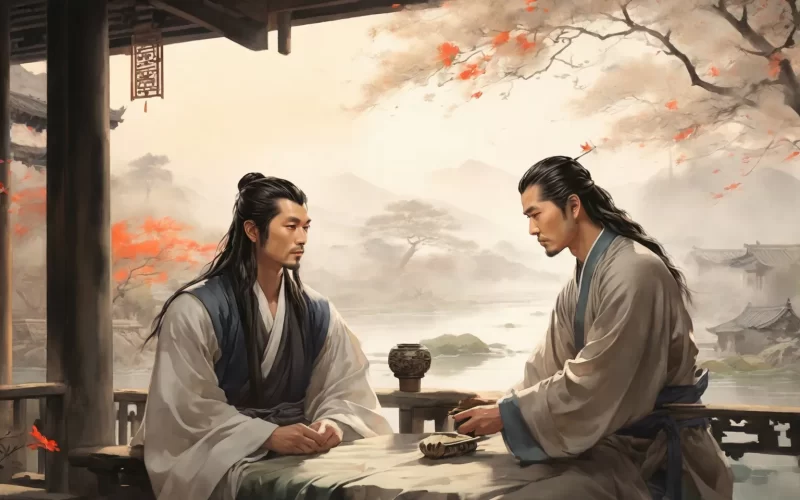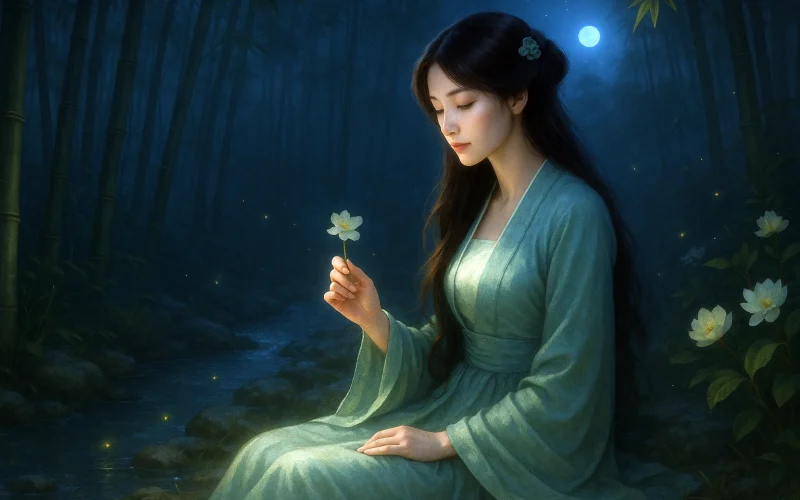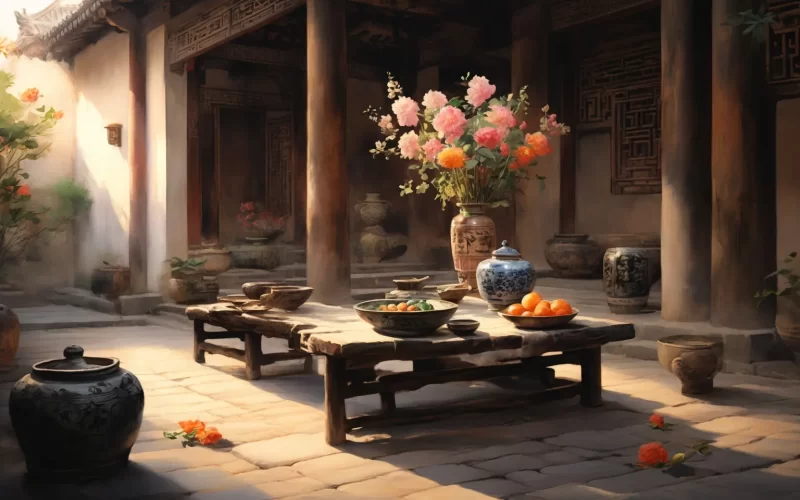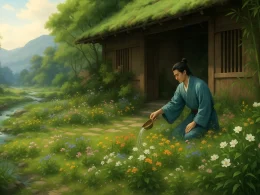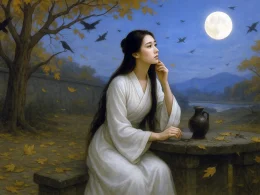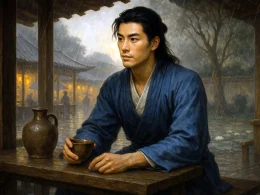I met you often when you were visiting princes
And when you were playing in noblemen's halls.
...Spring passes... Far down the river now,
I find you alone under falling petals.
Original Poem
「江南逢李龟年」
杜甫
岐王宅里寻常见, 崔九堂前几度闻。
正是江南好风景, 落花时节又逢君。
Interpretation
This poem was composed in the spring of the fifth year of the Dali era of Emperor Daizong of the Tang Dynasty (770 AD), during Du Fu's wanderings in Tanzhou, Hunan (present-day Changsha). During this period of displacement, Du Fu unexpectedly encountered Li Guinian, a once-renowned singer who had been a favorite of the imperial court during the Kaiyuan and Tianbao eras. However, after the An Lushan Rebellion, Li Guinian, like Du Fu, had fallen into hardship and wandered far from his former glory. This reunion stirred deep emotions in Du Fu, prompting him to write this poem, reflecting on the past and lamenting the vicissitudes of life.
First Couplet: "岐王宅里寻常见,崔九堂前几度闻。"
Qí wáng zhái lǐ xúncháng jiàn, Cuī jiǔ táng qián jǐ dù wén.
In the past, I often saw you at Prince Qi's residence and heard you sing several times at Cui Jiu's hall.
These lines recall Du Fu's earlier interactions with Li Guinian in Chang'an. Prince Qi, Li Fan, was the younger brother of Emperor Xuanzong and known for his love of literature and hospitality. Cui Jiu, or Cui Di, served as the Director of the Palace Library and frequently hosted gatherings at his home. Li Guinian, as a celebrated singer of the time, often performed at these noble residences. Through this recollection, Du Fu not only evokes the prosperity and cultural flourishing of the Tang Dynasty's golden age but also foreshadows the落魄 (downfall) that both he and Li Guinian would later experience.
Second Couplet: "正是江南好风景,落花时节又逢君。"
Zhèng shì jiāngnán hǎo fēngjǐng, luòhuā shíjié yòu féng jūn.
Now, in the beautiful scenery of Jiangnan, we meet again during the season of falling flowers.
This couplet describes the setting and timing of their reunion. The late spring scenery of Jiangnan, with its falling flowers, appears picturesque but carries profound symbolism. The "falling flowers" of late spring symbolize the twilight of life and the changes brought by time. The word "again" is particularly poignant, hinting at the shared experiences of turmoil and national decline that both men have endured, imbuing the reunion with deep emotion.
Overall Appreciation
On the surface, this poem recounts a chance reunion, but it is rich with deeper meaning. Du Fu contrasts the past glory of the Tang Dynasty with the present hardships faced by both himself and Li Guinian. Once a celebrated court singer, Li Guinian now wanders in Jiangnan, while Du Fu himself lives in displacement and hardship. Their unfortunate fates mirror the decline of the Tang Dynasty from its peak. The phrase "season of falling flowers" further encapsulates the passage of time and the changes it brings, revealing Du Fu's profound sorrow for his country and the era.
Writing Characteristics
- Interweaving of Time and Space, Subtle Emotion: The poet juxtaposes memories of "Prince Qi's residence" and "Cui Jiu's hall" with the present "beautiful scenery of Jiangnan," creating a contrast between past and present that conveys deep感慨 (reflection) without explicit words.
- Symbolism, Profound Imagery: The "season of falling flowers" is both a literal description and a symbol of life's impermanence, carrying profound metaphorical meaning.
- Concise Language, Rich Emotion: In just 28 characters, the poem vividly portrays the past prosperity of the Tang Dynasty and the current凄凉 (desolation) of the two men's lives, conveying deep and poignant emotion.
Insights
This poem, in its brevity, captures the impermanence of life and the changes brought by time. The lives of Du Fu and Li Guinian reflect the profound suffering inflicted by war on both society and individuals. Through the imagery of "falling flowers," Du Fu laments the transience of human affairs, reminding us to cherish the people and moments before us and not to lose sight of the deeper emotional bonds that connect us, regardless of life's ups and downs.
Poem translator
Kiang Kanghu
About the poet
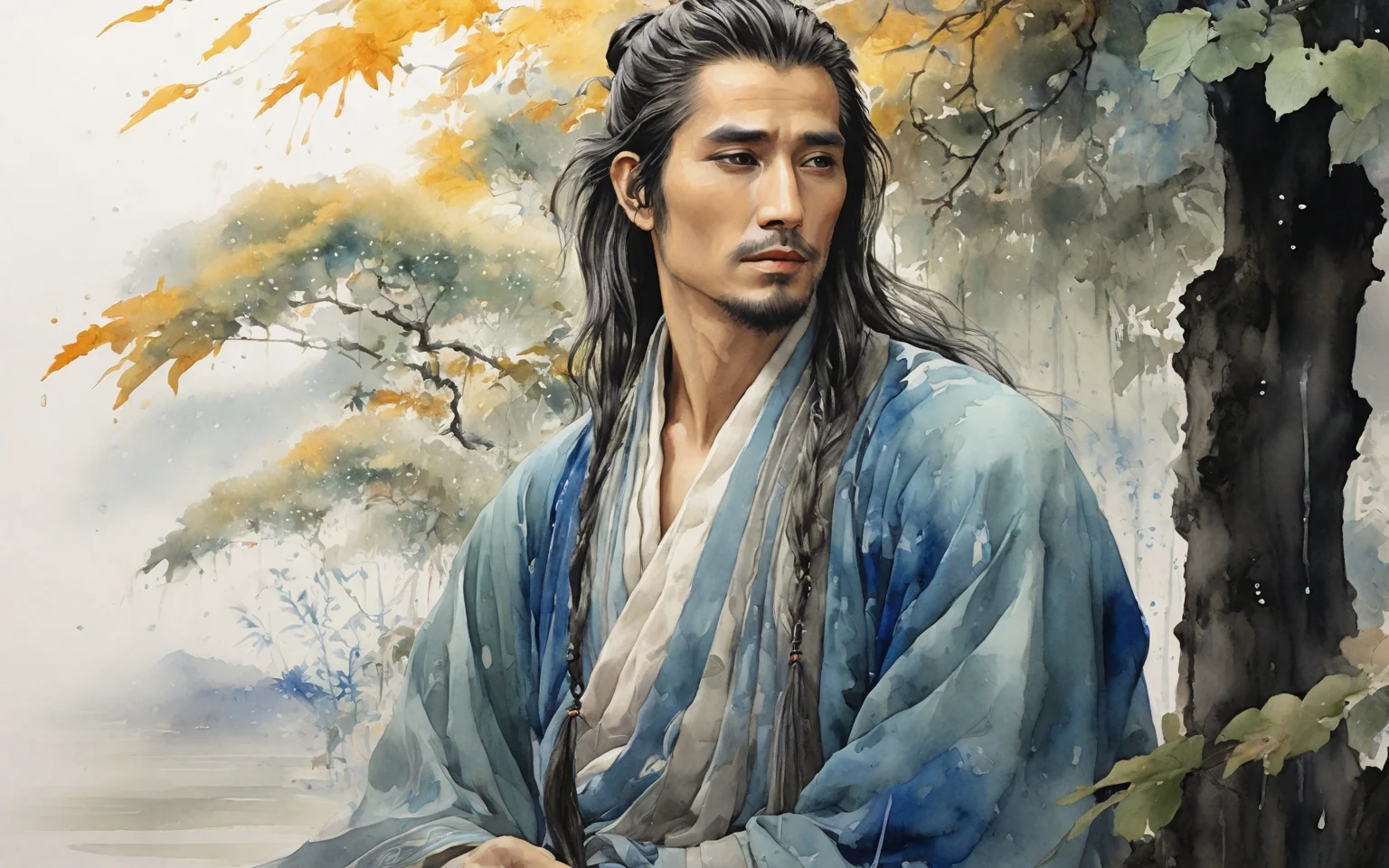
Du Fu (杜甫), 712 - 770 AD, was a great poet of the Tang Dynasty, known as the "Sage of Poetry". Born into a declining bureaucratic family, Du Fu had a rough life, and his turbulent and dislocated life made him keenly aware of the plight of the masses. Therefore, his poems were always closely related to the current affairs, reflecting the social life of that era in a more comprehensive way, with profound thoughts and a broad realm. In his poetic art, he was able to combine many styles, forming a unique style of "profound and thick", and becoming a great realist poet in the history of China.






